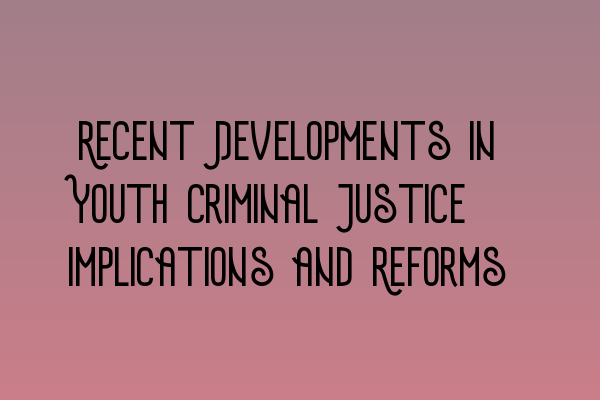Recent Developments in Youth Criminal Justice: Implications and Reforms
As solicitors specializing in criminal law, it is important for us to stay up-to-date with the latest developments and reforms in youth criminal justice in the UK. The way we handle and rehabilitate young offenders has a significant impact on both their future and the safety of our communities. In this blog post, we will explore some of the recent changes in youth criminal justice and discuss their implications.
The Raising of the Age of Criminal Responsibility
One significant reform in youth criminal justice is the raising of the age of criminal responsibility. Previously, the age at which a child could be held criminally responsible was 10 years old. However, recent legislation has increased this age to 12 years old. This change recognizes the developmental immaturity of young children and aims to divert them away from the criminal justice system towards support and rehabilitation.
The Demystifying the Solicitors Qualifying Examination Format provides a comprehensive overview of the legal qualifications and examinations required to become a solicitor. It is important that solicitors specializing in youth criminal justice are knowledgeable about the legal aspects and requirements of their profession.
Focus on Rehabilitation and Diversion
Another key shift in youth criminal justice is the increased focus on rehabilitation and diversion programs for young offenders. The aim is to address the underlying issues that contribute to offending behavior and provide young individuals with the necessary support and guidance to reintegrate into society as law-abiding citizens.
To understand the process of forming a Limited Liability Company (LLC) in the UK, refer to the step-by-step guide provided in LLC Formation Made Simple: Step-by-Step Guide for UK Entrepreneurs. This resource can be helpful for individuals interested in starting their own businesses and understanding the legal requirements involved.
Restorative Justice Practices
Restorative justice practices have gained momentum in recent years and have shown promising results in youth criminal justice. These practices focus on repairing harm caused by the offense, addressing the needs of the victims, and facilitating dialogue between offenders and their victims. By involving all stakeholders in the process, restorative justice seeks to promote accountability and reduce reoffending rates.
For a comprehensive overview of business regulations in the UK, including those related to criminal liability, consult the article Business Regulations in the UK: A Comprehensive Overview. Understanding the legal framework within which businesses operate can help solicitors provide effective guidance to young individuals interested in pursuing lawful careers.
Role of Community-Based Organizations
Community-based organizations play a vital role in supporting the rehabilitation and reintegration of young offenders. By providing mentorship, education, and employment opportunities, these organizations help young individuals develop the skills and confidence necessary to steer clear of criminal activities. Collaboration between legal professionals and community organizations is essential in ensuring a holistic and effective approach to youth criminal justice.
When preparing for the solicitors qualifying examination (SQE) in criminal law, it is important to utilize resources and strategies for success. Check out the article Preparing for the SQE Exam: Strategies and Resources for Success to gain valuable insights and tips on exam preparation.
Challenges and Future Directions
While the recent developments in youth criminal justice have been positive, challenges still remain. The adequate funding and resourcing of support services, the coordination between different agencies, and the need for ongoing analysis and evaluation of the effectiveness of various programs are just some of the issues that need to be addressed for continued progress.
For additional support in preparing for the SQE exam, consider participating in SQE workshops and webinars. These valuable learning opportunities can help you accelerate your exam preparation and enhance your chances of success. Learn more about SQE Workshops and Webinars: Accelerate Your Exam Preparation and take advantage of expert guidance.
In conclusion, the recent developments in youth criminal justice have brought about positive changes in how we approach and handle young offenders. By raising the age of criminal responsibility, focusing on rehabilitation and diversion programs, embracing restorative justice practices, and strengthening the role of community-based organizations, we can create a more inclusive and effective system for youth criminal justice in the UK.
